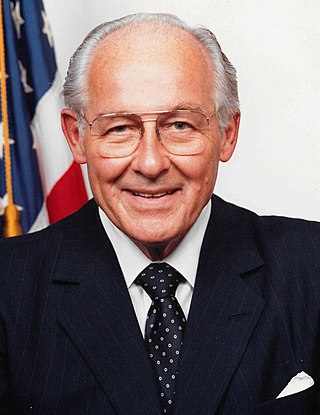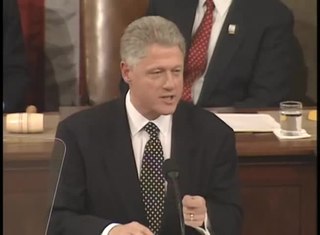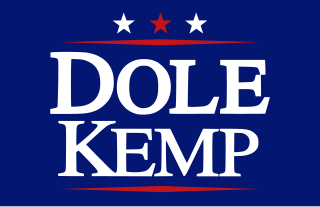Related Research Articles

The State of the Union Address is an annual message delivered by the president of the United States to a joint session of the United States Congress near the beginning of most calendar years on the current condition of the nation. The State of the Union Address generally includes reports on the nation's budget, economy, news, agenda, progress, achievements and the president's priorities and legislative proposals.

Newton Leroy Gingrich is an American politician and author who served as the 50th speaker of the United States House of Representatives from 1995 to 1999. A member of the Republican Party, he was the U.S. representative for Georgia's 6th congressional district serving north Atlanta and nearby areas from 1979 until his resignation in 1999. In 2012, Gingrich unsuccessfully ran for the Republican nomination for president of the United States.
The "Republican Revolution", "Revolution of '94", or "Gingrich Revolution" are political slogans that refer to the Republican Party's (GOP) success in the 1994 U.S. mid-term elections, which resulted in a net gain of 54 seats in the House of Representatives, and a pick-up of eight seats in the Senate. It was led by Newt Gingrich.

Robert Henry Michel was an American Republican Party politician who was a member of the United States House of Representatives for 38 years. He represented central Illinois' 18th congressional district, and was the GOP leader in the House, serving as House Minority Leader during his last 14 years in Congress (1981–1995).
A New Covenant was a political slogan used by U.S. President Bill Clinton to describe his political philosophy and agenda. The term was used sporadically during the 1992 campaign and Clinton's terms in office to describe a "new social compact" between the United States Government and its citizens.

Barack Obama, the 44th president of the United States, addressed a joint session of the United States Congress on Tuesday, February 24, 2009. It was his first public address before a joint session. Similar to a State of the Union Address, it was delivered before the 111th United States Congress in the Chamber of the United States House of Representatives in the United States Capitol. Presiding over this joint session was the Speaker of the United States House of Representatives, Nancy Pelosi, accompanied by Joe Biden, the vice president in his capacity as the president of the Senate.

The 1997 State of the Union Address was given by the 42nd president of the United States, Bill Clinton, on February 4, 1997, at 9:00 p.m. EST, in the chamber of the United States House of Representatives to the 105th United States Congress. It was Clinton's fourth State of the Union Address and his fifth speech to a joint session of the United States Congress. Presiding over this joint session was the House speaker, Newt Gingrich, accompanied by Al Gore, the vice president, in his capacity as the president of the Senate.

The 1994 United States elections were held on November 8, 1994. The elections occurred in the middle of Democratic President Bill Clinton's first term in office, and elected the members of 104th United States Congress. The elections have been described as the "Republican Revolution" because the Republican Party captured unified control of Congress for the first time since 1952. Republicans picked up eight seats in the Senate and won a net of 54 seats in the House of Representatives. Republicans also picked up a net of ten governorships and took control of many state legislative chambers. This is the first midterm election since 1946 in which the Republicans ended unified Democratic control of Congress in a midterm election under a Democratic president.

The 1999 State of the Union Address was given by the 42nd president of the United States, Bill Clinton, on January 19, 1999, at 9:00 p.m. EST, in the chamber of the United States House of Representatives to the 106th United States Congress. It was Clinton's sixth State of the Union Address and his seventh speech to a joint session of the United States Congress. Presiding over this joint session was the House speaker, Dennis Hastert, accompanied by Al Gore, the vice president, in his capacity as the president of the Senate.

The 1998 State of the Union Address was given by the 42nd president of the United States, Bill Clinton, on January 27, 1998, at 9:00 p.m. EST, in the chamber of the United States House of Representatives to the 105th United States Congress. It was Clinton's fifth State of the Union Address and his sixth speech to a joint session of the United States Congress. Presiding over this joint session was the House speaker, Newt Gingrich, accompanied by Al Gore, the vice president, in his capacity as the president of the Senate.

The 1996 State of the Union Address was given by the 42nd president of the United States, Bill Clinton, on January 23, 1996, at 9:00 p.m. EST, in the chamber of the United States House of Representatives to the 104th United States Congress. It was Clinton's third State of the Union Address and his fourth speech to a joint session of the United States Congress. Presiding over this joint session was the House speaker, Newt Gingrich, accompanied by Al Gore, the vice president, in his capacity as the president of the Senate.

The 1994 State of the Union Address was given by the 42nd president of the United States, Bill Clinton, on January 25, 1994, at 9:00 p.m. EST, in the chamber of the United States House of Representatives to the 103rd United States Congress. It was Clinton's first State of the Union Address and his second speech to a joint session of the United States Congress. Presiding over this joint session was House speaker Tom Foley, accompanied by Vice President Al Gore, in his capacity as the president of the Senate.
The 1992 State of the Union Address was given by the 41st president of the United States, George H. W. Bush, on January 28, 1992, at 9:00 p.m. EST, in the chamber of the United States House of Representatives to the 102nd United States Congress. It was Bush's third and final State of the Union Address and his fourth and final speech to a joint session of the United States Congress. Presiding over this joint session was the House speaker, Tom Foley, accompanied by Dan Quayle, the vice president, in his capacity as the president of the Senate.
Newt Gingrich has declared his position on many political issues through his public comments and legislative record, including as Speaker of the House. The political initiative with which he is most widely identified was the Contract With America, which outlined an economic and social agenda designed to improve the efficiency of government while reducing its burden on the American taxpayer. Passage of the Contract helped establish Gingrich's reputation as a public intellectual. His engagement of public issues has continued through to the present, in particular as the founder of American Solutions for Winning the Future.
As a result of conflicts between Democratic President Bill Clinton and the Republican Congress over funding for education, the environment, and public health in the 1996 federal budget, the United States federal government shut down from November 14 through November 19, 1995, and from December 16, 1995, to January 6, 1996, for 5 and 21 days, respectively. Republicans also threatened not to raise the debt ceiling.
The 1956 State of the Union Address was delivered by Dwight D. Eisenhower, the 34th president of the United States, on Friday, January 5, 1956, to both houses of the 84th United States Congress in written format. Eisenhower did not deliver a speech before a joint session of Congress because he had suffered a major heart attack four months prior and was recovering in Key West, Florida. Instead, Eisenhower opted to pre-record remarks from his office at the Naval Air Station in Key West summarizing his State of the Union Address which were broadcast to the nation in the evening on January 5.
The 1800 State of the Union Address was given by John Adams, the second president of the United States, on Tuesday, November 11, 1800, to a joint session of the 6th United States Congress. It was the first State of the Union Address delivered at the new United States Capitol in Washington, D.C.

The 1996 presidential campaign of Bob Dole began when Republican Senator and Senate Majority Leader Bob Dole formally announced his candidacy for Republican Party nomination in 1995. After beating other candidates in the primaries, he became the Republican nominee, with his opponent being Democratic incumbent President Bill Clinton in the 1996 presidential election. Dole conceded defeat in the race in a telephone call to Clinton on November 5, 1996.

Bill Clinton, the 42nd president of the United States, addressed a joint session of the United States Congress on Wednesday, February 17, 1993. It was his first public address before a joint session. Similar to a State of the Union Address, it was delivered before the 103rd United States Congress in the Chamber of the United States House of Representatives in the United States Capitol. Presiding over this joint session was the Speaker of the United States House of Representatives, Tom Foley, accompanied by Al Gore, the vice president in his capacity as the president of the Senate.
References
- ↑ Woolley, John; Peters, Gerhard. "Length of State of the Union Messages and Addresses (in minutes)". The American Presidency Project. Retrieved 2011-02-20.
- 1 2 Woolley, John; Peters, Gerhard. "Length of State of the Union Messages and Addresses (in words)". The American Presidency Project. Retrieved 2011-02-20.
- ↑ Woolley, John; Peters, Gerhard. "List of Opposition Responses to State of the Union Addresses". The American Presidency Project. Retrieved 2011-02-20.
- ↑ Peterson, Iver (January 24, 1995). "WHITMAN PLEDGES EARLY COMPLETION OF 30% TAX CUT". New York Times.
- ↑ "State of the Union Response: Date January 24, 1995". C-SPAN. Archived from the original on 2011-07-25. Retrieved 2011-02-25.
- ↑ Devroy, Ann (January 25, 1995). "Clinton Calls for a Centrist 'Social Compact'". Washington Post.
- ↑ "Williams: Why Dems changed course on illegal immigration". January 17, 2019.

